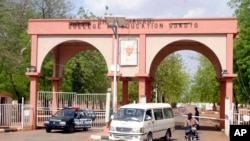ABUJA, NIGERIA —
Religious groups and rights activists in Nigeria are calling for justice after a female Christian student was killed by a mob for alleged blasphemy.
The student was beaten and burned to death on the premises of a school in northwestern Sokoto state.
The Catholic Diocese of Sokoto criticized the attack in a statement Friday and called on state authorities to catch and prosecute the killers.
Rights groups like Amnesty International, and the Socio-Economic Rights Accountability Project or SERAP, have also condemned the attack and are demanding justice for the student.
Police say two people have so far been arrested in connection with the incident and that they're searching for others who took part in the killing.
The incident took place at the Shehu Shagari College of Education in Sokoto state. A mob of students flogged, stoned and eventually burned Deborah Yakubu to death near the school Thursday.
The students accused Yakubu of making blasphemous comments about the Muslim prophet Mohammed during an online argument with classmates.
The argument took place during the Muslim Ramadan holiday. But when school resumed Thursday, a group of students attacked Yakubu.
Seun Bakare is an Amnesty International spokesperson.
"It is not only sad but deeply disturbing because this is not the first time that things like this continue to happen," Bakare said. "We have called for a thorough and impartial investigation into what truly transpired and we're hoping that the perpetrators will be brought to book so it can serve as a deterrent."
The Christian Association of Nigeria blames authorities for failing to prevent the attack. Sokoto State authorities have shut down the school indefinitely.
Under Nigeria’s secular law, blasphemy is punishable by up to two years in prison. But in the more conservative northern region where religious or Sharia law is favored, blasphemy is often treated with stiffer punishments, including a possible death sentence.
Last month, a court in northern Kano state sentenced a Nigerian atheist to 24 years in prison for blasphemy.
Bakare said both the secular and Sharia laws flout international human rights standards.
"When compared to international human rights law, none of these laws can stand because international human rights law guarantees the freedom and Nigeria is a state party to international standards that uphold the freedom of expression," Bakare said.
Last November, the U.S. government removed Nigeria from its list of countries that violate religious freedom.




